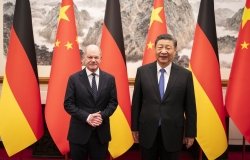Common Ground for Obama and Putin Is Offshore
While low expectations surround the G20 meeting in St. Petersburg, there is one timely matter that resonates with Washington, Moscow, and the entire G20 — the continuing fight against offshore tax havens, writes William Pomeranz.
Low expectations surround the G20 meeting in St. Petersburg on September 5-6.
President Barack Obama’s decision to cancel the pre-G20 summit with Russian President Vladimir Putin means the big photo op will likely be the two leaders awkwardly trying to avoid each other. The other headline-making issues in U.S.-Russian relations — Syria, nuclear weapons reduction, missile defense — also appear off the table now. There is one timely matter, however, that resonates with Washington, Moscow, and the entire G20 — the continuing fight against offshore tax havens.
The Cyprus financial collapse in March focused world attention on the outsized role played by offshore banking zones in international tax avoidance and money laundering. Though Russian depositors were the primary victims here, Moscow appeared indifferent to this unprecedented expropriation by Cyprus of the assets of Russian citizens. Putin proved unwilling to help those he viewed as tax-evading oligarchs and corrupt bureaucrats — as well as a few legitimate businesses.
Putin has made the fight against offshore tax havens a key plank of his foreign policy. Other world leaders — including British Prime Minister David Cameron and French President Francoise Hollande — have also issued strong statements criticizing sophisticated legal strategies that allow companies to skirt the domestic treasury, depriving the state of critical revenues in this time of economic recession.
The United States supports the global effort to rein in offshore tax havens and has gone one step further by passing the Foreign Account Tax Compliance Act (FATCA). This bill obliges foreign financial institutions to report on bank accounts of U.S. citizens abroad, with a threat of substantial withholding assessments for failing to do so.
About the Author

William E. Pomeranz
William Pomeranz, the Director of the Wilson Center’s Kennan Institute, is an expert guide to the complexities of political and economic developments in Russia, particularly through the lens of law. He leverages extensive, hands-on experience in international and Russian jurisprudence to address a wide range of legal issues, from the development of Russia’s Constitution to human rights law to foreign investment and sanctions. He is also the author of Law and the Russian State: Russia's Legal Evolution from Peter the Great to Vladimir Putin (Bloomsbury, 2018).
Read More
Kennan Institute
The Kennan Institute is the premier US center for advanced research on Russia and Eurasia and the oldest and largest regional program at the Woodrow Wilson International Center for Scholars. The Kennan Institute is committed to improving American understanding of Russia, Ukraine, Central Asia, the Caucasus, and the surrounding region though research and exchange. Read more










